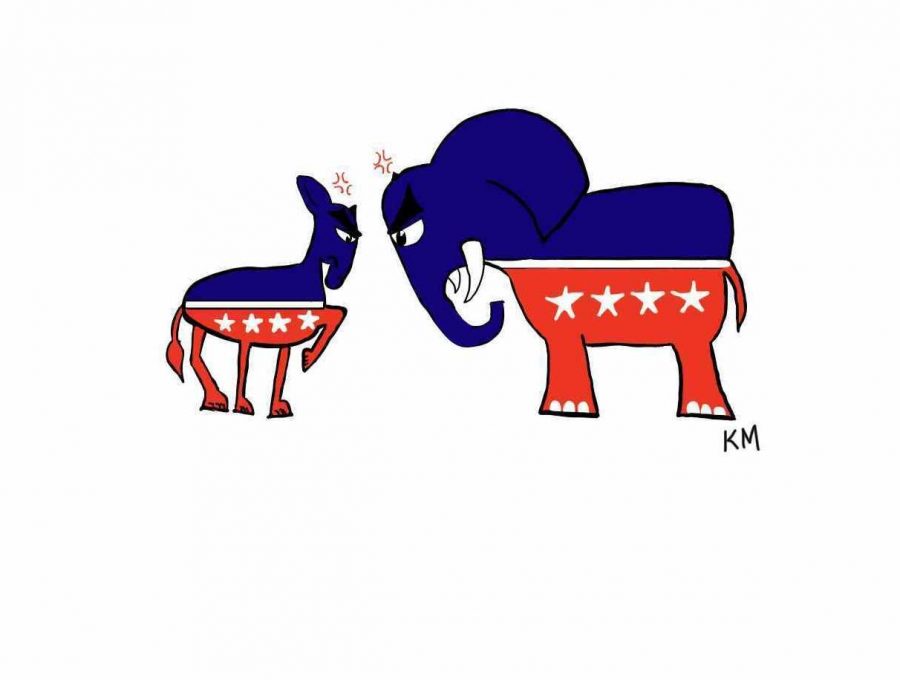Op-ed: Polarization is the inevitable fate of the two-party system
Increased polarization in recent years have rung alarms for many about the political fate of our country.
December 7, 2020
It’s what George Washington warned against in his farewell address: the bitter partisan divides and false loyalties as a result of our opposing parties have come true. But Washington anticipated fights over country loyalties, involvement in wars and petty political games. Today, our political divides include those elements, but also encompass health care access, gay marriage and immigration.
So what happened to the boring stuff that we’re all supposed to associate with politics, like taxes, foreign policy and the size of the government? When did politics become a highly publicized fight over abortion rights and whether or not the world is on fire?
Truth be told, the only time when American politics didn’t substantially involve civil liberties was when only cishet white men had all their rights. Even the 19th Amendment was a partisan issue, introduced and voted for by primarily Republicans, with far fewer Democrats on their side. The Republican Party was even founded to oppose the Democratic Party’s position supporting slavery; the parties switched platforms in the 1960s due to opposing views on Black Americans’ civil rights. The parties exist to be in opposition to each other, which means polarization is inevitable.
Polarization has gotten worse because more people have been pushing for an expansion of civil rights. As more civil liberties are introduced to politics, the divide between conservatives and liberals has gotten larger as they take more opposing stances on issues.
But the Republican Party isn’t only composed of Southern white supremacists, and conservatism isn’t all bigotry. If you’re a white supremacist who doesn’t believe that Black people should be able to vote or that the LGBTQ+ community should have rights, you’re not a Republican — you’re a bigot.
True conservatism isn’t any of these things. While some argue that the Republican party can be a platform for bigotry, liberals often take that to the extreme and label every conservative a racist. The Democratic Party has to fight against Republicans to protect civil liberties, which explains why they are so quick to condemn anyone who disagrees on the slightest fronts. Because of this, I know many people who only vote blue because they are the only party that is supposed to actively fight for your rights if you’re a person of color, poor and/or gay. Biden, for example, isn’t unique in his strategy of appealing to Black voters throughout his campaign, and they ultimately helped him win — though Republicans are no less guilty of using identity politics to attract voters.
Polarization extends to the media as well, or at least the perception of polarization. If we weren’t so polarized, many media outlets wouldn’t be viewed as extremely liberal; in reality, most of them are only slightly left-leaning. Climate change and calling out bigotry in the White House aren’t necessarily liberal issues, but they may seem more so because there are comparatively fewer other news outlets that are slightly right-leaning. If things weren’t so polarized, The New York Times wouldn’t serve as a stark liberal contrast to conservative news outlets.
Polarization can even be extended to social groups and movements. Black Lives Matter is seen as a liberal issue, and the conservative Blue Lives Matter was formed in direct opposition to it. Anti-abortion groups adopted the term “pro-life” in direct opposition to Roe v. Wade. People began using #HimToo after Brett Kavanaugh’s hearing to counter #MeToo. Polarization has made it so that respecting other, often marginalized, social groups is seen as liberal, because the other side is seen as a direct contrast to everything liberal.
So what now? Where do we go from here? If we want to save this system, we should start with respect. As of now, people on both sides of the aisle are completely unwilling to engage in any meaningful (and respectful) debates. Both sides are guilty of reducing people to political views, and I think that’s a good place to start. We can’t attempt to fix polarization until we agree to work together without all the defensiveness and ad hominem attacks.
For those of us who are less inclined to believe that this two-party system can be salvaged, respect is also a first step. For everyone who’s had to make a choice between two parties that don’t always reflect their values, a more respectful political environment would allow them to express their views more comfortably. That, in turn, could encourage the development of other parties, which would solve many of the problems that our friend George warned us about way back in 1796.
Change has to start on the individual level, with everyone being a little more open to hearing the voices of the other side. Once we take that first step, it will be easier to make politics boring again.
Mia Merchant is a first-year in the Explore Program. She can be reached at [email protected].


















